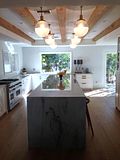 |
| St. Anthony's harbour |
I know I'm writing lots about our trip to western Newfoundland, but I always enjoy reading other people's blog posts about interesting places so I thought I would continue on with the series. I've covered food, accommodation, and icebergs and in the next two posts I wanted to tell you about a few of the best activities from our trip there. I've divided my post into the two main areas we visited - the St. Anthony area on the northern tip that I'll talk about this time and Gros Morne National Park half way down the peninsula that I will cover in my next post.
The northern tip of the Great Northern Peninsula felt really remote and ... well northern. The trees are stunted and in some places won't even grow because of the long cold winters and the strong ocean winds. The plants that grow there are hardy ones that can also be found in alpine and arctic areas. My mother was familiar with many of the shrubs and wildflowers from her numerous trips to the Rockies and the mountains in British Columbia.
Being off the beaten path and a little remote has its advantages though, as there weren't many people up there. It was such a treat to be alone on the beaches and hiking trails and being able to stop anywhere to take photos. Which I did! Like the one of the roadside gardens below.
Here's another clue that you are up north. We saw gardens (fenced off to keep out the moose) all along the northern part of the peninsula. They put their vegetable gardens along the roads instead of beside their homes because it is not only warmer inland, but also there is more soil as you move away from the rocky coast.
We also saw komatiks or sleds everywhere which are used to transport things in the winter. They are built with runners so they can glide over the snow and ice and were originally pulled by dogs, but now are usually pulled by snowmobile.
And there were still remnants of snow in the gulleys. Nothing makes you feel like you are up north than seeing snow in July. It was still early spring up there as the sea ice only broke up on June 20th. Crazy, eh - that was only a few weeks before we went there. This area routinely has polar bears float into town in the spring on ice pans.
We loved the slower pace of life in northern Newfoundland and some of our favourite days were just spent puttering around pebble beaches, looking for pretty stones, searching for fossils, following trails, and watching the ocean. We would simply follow a road until you couldn't go any further ... until you ended up at places that looked like this.

So apart from the puttering, there were five main attractions we enjoyed (you can click on the place name to go to the official websites):
1. L'Anse aux Meadows
L'Anse aux Meadows is a Viking village. How cool is that? You can tour the reconstructed buildings, the archaeological remains, and a museum displaying the 1000 year old artifacts that were found in the area. L'Anse aux Meadows was declared a UNESCO World Heritage Site soon after it was discovered in 1960.
I should warn you that much of the interest in exploring L'Anse aux Meadows is the wow factor of seeing the oldest European settlement in the New World and especially the whole Viking thing. It is a bit more of a cerebral wow than an actual wow. Only a few artifacts have been found and there are only three reconstructed buildings as the original village was very small and was used for less than a decade. We still enjoyed it though and are glad we visited.
2. Norstead Viking Village
Just down the road from L'Anse aux Meadows is Norstead Village, a replica of a Viking port of trade. This is where you can see and live the Norse life with a complete village in operation including a church, a blacksmith, and a boat shed containing replica Viking ships. One of the ships on display is the Snorri, a 54 foot replica of a Viking knarr, that was used in 1998 to sail from Greenland to L'Anse aux Meadows.
To be honest there was more going on here than there was at L'Anse aux Meadows. In particular, we enjoyed seeing the actual size of ship the Vikings had used to sail across the open ocean. Yikes, they were a very brave lot! We also enjoyed seeing one of the women demonstrate nalbinding kntting which is an ancient single-needle form of knitting used by the Vikings.
3. Grenfell Historic Properties (in St. Anthony)
Wilfred Grenfell (1865-1940) was a medical missionary who not only set up the first hospitals in the area, but helped the people improve their lives by establishing schools, orphanages, fishing and lumber coops, and small industries. One of the more popular ventures was encouraging the women of the area to make hooked rugs that were a means for them to earn incomes for their families. The hooked mats were sold around the world and have since become collectors items. Grenfell also engaged in extensive fundraising efforts through writing books and going on lecture tours. He is a much admired and esteemed man in Newfoundland.
The Grenfell Historic Properties are located in St. Anthony and include an interpretive centre which gives information about Grenfell's life, the impact he had on the area, and there is a shop that sells handicrafts.





We really enjoyed the boat ride we took to see whales and icebergs. What's not to like when you see both a 200 foot high iceberg and a minke whale swimming underwater along side the boat in the same trip. You can read more about the icebergs here.
5. Dark Tickle (in St. Lunaire - Griquet)
Yep, it's known as The Dark Tickle Experience (I'm not kidding, that's what they call it). I should mention that a tickle is a passage of water between two land masses. That being said, who wouldn't wouldn't want to shop at a store called Dark Tickle. This is one of the main places that makes jams and jellies from local berries and you can find Dark Tickle products all over western Newfoundland. There is something special about going to the source though. You can watch them making the jams and see huge bowls of local berries and lots of handicrafts. We brought home lots of jam and not one, but two winter hats for me. I know crazy, right, buying winter hats on your summer vacation.
And shopping at Dark Tickle allows you to have yummy things like this on your toast - bakeapple jam (on the left) and partridge berry jam (on the right). Yum!
UPDATE: To read part 2 of our itinerary in Newfoundland, click here.









































































































































































































.jpg)



















































































.jpg)



























Absolutely amazing. I'm so glad you shared your adventures with us - there are so many places I can never visit and by reading these kinds of posts I learn history, amazing facts and see fabulous photos. Thank you. The sleds are wonderful - loved the ocean views and the villages - what treasures. Thank you again
ReplyDeleteBreathtaking! Looks like you had a wonderfully beautiful time! Thanks for letting us in on the beauty!
ReplyDeleteI adore these travel posts! Keep them coming :)
ReplyDelete